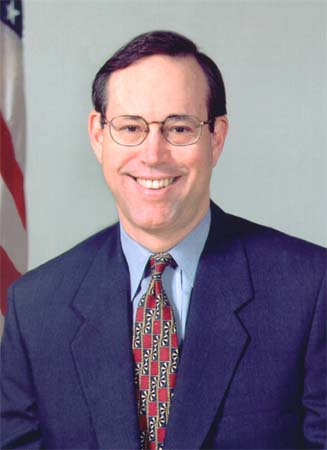
Ohio Gov. Bob Taft will propose the most sweeping change in the state's tax system in 70 years in his State of the State address
Taft to propose tax overhaul
Governor wants to attract businesses
By John Byczkowski
Enquirer staff writer
Ohio Gov. Bob Taft will propose the most sweeping change in the state's tax system in 70 years in his State of the State address Tuesday, as lawmakers attempt to make over the state's high-tax reputation and jump-start job growth.
Following a blueprint proposed by leaders of the state's largest companies, Taft is expected to propose killing levies that businesses hate most: those that tax capital, profits and net worth.
But the changes that Taft will outline also will affect individual Ohioans. He is expected to propose across-the-board cuts in individual income tax rates while seeking to raise "sin" taxes and replace at least part of a sales-tax increase that expires in July.
Tax reform goes hand in hand with tackling the state's $4 billion budget deficit. "The focus of the State of the State is going to get very much into meaningful tax reform and restraint of government spending, and you can't have one without the other," Taft spokesman Mark Rickel said. Taft plans to visit several cities, including Cincinnati, Wednesday to promote the plan.
The aim of Taft's plan is to cut the high tax rates that policymakers think scare businesses from Ohio.
Taft also wants to lift the tax burden from manufacturing and spread the pain. Ohio, a state that takes pride in its skill at making things, has seen one of every five manufacturing jobs disappear in the last five years.
"We're trying to repair the damage," said Rep. Sally Conway Kilbane, chairwoman of the House's tax-writing Ways and Means Committee. The Republican from the western Cleveland suburb of Rocky River has a Ph.D. in economics - and is an advocate of tax reform.
"In order to get economic growth and development, you increase capital, you need highly qualified labor plus quantity of labor, and you need technology."
The tax system should reward investment and not penalize it, said Richard Stoff, executive director of the Ohio Business Roundtable, which has been working for more than a year on tax reform.
"The vision essentially is that by the end of the decade, our tax climate will be viewed as a distinctive public asset in our state's economic growth and our standard of living, as measured by an upturn in business formation, as measured by job creation," he said.
Taft has been meeting for weeks with legislative leaders and the heads of the state's leading business organizations, discussing his plan and getting feedback.
"What we've been trying to do is work together so that we can all be on the same page," said Sen. Steve Austria, R-Beavercreek, a member of the Ways and Means Committee.
Who's paying more?
Not all businesses, however, are lining up behind the governor. If the tax base is broadened and manufacturers pay less, then someone has to pay more. As details emerge, retailers and small businesses in particular are complaining more loudly, and the Ohio Chamber of Commerce is busy writing its own, less radical tax overhaul.
Almost everyone agrees on dumping the state's tangible personal property tax, for instance.
But replacing it with a tax based on sales "is not fair to retailers," said Lora Miller, governmental affairs director for the Ohio Council of Retail Merchants. And regarding talk of increased taxes on beer and cigarettes, "we always have a problem when there's a proposal to increase excise taxes on products that our members sell," she said.
The plan also is likely to draw sharp questions from Democrats in the Statehouse.
Rep. Bill Hartnett, the ranking minority member on the Ways and Means Committee, said he's concerned Republicans are planning to run the plan through the legislature quickly.
"I don't think they're going to let it hang around very long," the lawmaker from Mansfield said.
Key changes The Business Roundtable's template for tax reform looks like this:
• Get rid of the tangible personal property tax, a tax on the value of machinery, equipment, and inventory. Every tax study commissioned by the state since 1968 has recommended getting rid of it.
• Get rid of the corporation franchise tax - a tax on company profits and net worth. It's a tax companies hate and have become good at avoiding. "The corporate franchise tax is the worst of both worlds - you have high rates and low collections," Stoff said.
• Replace those with a single general business tax. The most talked-about replacement is a gross receipts tax - a tax on sales made in Ohio to Ohio customers and businesses. The tax would have a low rate and be broad, falling on businesses such as lawyers, accountants and business consultants who now pay almost no taxes, as well as many companies based out of state. There also might be an exemption of the first $1 million in sales - a break for small businesses. Opponents complain that it doesn't take into account a business' level of profit.
• Retain some tax exemptions for industries the state needs to develop, such as high-tech.
• Cut individual income tax rates across the board. The primary goal would be to reduce the top rate from 7.5 percent to 6 percent or less.
• Raise taxes on consumption. That means retaining some or all of the 1-penny sales tax increase enacted in 2002 as well as raising taxes on cigarettes and alcohol.
Within that framework is a beehive of details that need work. School districts get 70 percent of the money from the tangible personal property tax. How would that be replaced?
The state's Department of Development has issued billions of dollars in tax credits to businesses to get around the franchise tax. What happens to those credits - and the companies that received them - if the franchise tax goes away?
Shifting tax burdens
There are bigger concerns that tax reform would shift the state's tax burden from business to individuals, from rich to poor, from the state to local governments.
Policy Matters Ohio, a policy research group in Cleveland, says the share of taxes paid by businesses has been shrinking. In 1976, individuals paid about 60 percent of all state and local taxes in Ohio. In 2002, that share had risen to 70 percent. The group adds that cutting income tax rates across the board by 22 percent - in the range that Taft is expected to propose - would give the biggest tax cuts to the wealthiest taxpayers.
Hartnett said he fears tax reform won't do enough for the state's middle class.
"If they're going to ask middle-class people to pay a lot of sales tax more than they're paying now - not only the additional penny but on additional sales - then I think there's going to be some real concern about whether everybody's paying their fair share," he said.
Rep. Steve Driehaus, a Cincinnati Democrat who is the House minority whip, said he fears that eliminating tax sources that go to local governments means many towns and cities will have to find other ways to pay for basic services.
"The only avenue they have often is property tax, and people are getting sick and tired of increasing property taxes," he said.
Will the state's General Assembly go for a plan this radical? Rep. Tom Raga, R-Mason, said he thinks that legislators don't want to keep nibbling at the tax code to make it more palatable.
"Right now, it is my sense that legislators would like to see a larger step taken, a more drastic overhaul," he said.
E-mail johnb@enquirer.com










